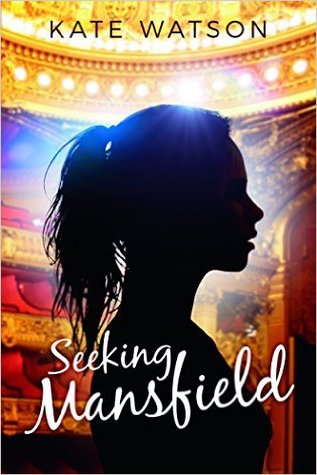Seeking Mansfield

Adapted from: GoodReads
An original take on Mansfield Park by Jane Austen. Author Kate Watson takes some liberties with the character backstories to make the story her own, but stays true to their personalities. The adaptation of the adult tale to a YA world was artfully done to make the eventual “coming into oneself” of the main characters all the more powerful. Recommended to fans of a heartwarming, if slightly frustrating, tale and Austen fans, of course!
Note: This review is based on the uncorrected advanced proof of Seeking Mansfield by Kate Watson.
Book Breakdown
I have a confession; though I am a big Jane Austen fan, I haven’t actually read Mansfield Park yet. However, to appreciate this adaptation I felt it was necessary to have a basic understanding of the original story, so I viewed the 1999 film adaptation. Thus that is my frame of reference when I refer to the “original” Austen version of this story. XD

This is the story of Finley, nicer than Fanny as far as name go, good call Kate Watson!, Price, virtually orphaned and living with family friends, the Bertrams. She is quiet and fiercely loyal, indecisive on the surface but with a raging passion under it all. Finley is making progress defeating some pretty big personal demons with the support of her best friend and confidant Oliver, because Edmund was too old fashioned?, his nurturing parents Thomas and Mariah, and the less nurturing Aunt Nora. Then, in comes a major curveball, the Crawfords, drama-prone less by coincidence and more by choice, Emma and Harlan; simultaneously set-back and speed up Finley’s personal development in interesting ways.
This take on Mansfield Park, like the original story, relies on big, bold characters to propel the story, usually through their own purposeful actions more than mere reactions to what happens to them. The Crawfords especially are very take-charge personalities and they keep the plot moving, if not forward, on an entertaining detour to be sure! Watson manages to modernize these characters but still respects and maintains their essence.
Seeking Mansfield is a quick read, the story is told in the 3rd person narrative from the alternating perspective of Finley and Oliver. This is particularly fitting, as they are the two most enigmatic characters; the rest tend to be open-books in terms of expressing their emotions and thoughts.
In my Opinion
Watson’s masterful updates of Jane Austen’s cast of characters and the addition of her own flair, specifically in the characters backstories, are a massive success. As is the decision to sustain the extended metaphor of the Mansfield theater program application as a measure for the progress Finley makes finding her courage. From completing the application, getting parental permission, and eventually interviewing, it is a nice metaphor for the personal growth that Finley experiences throughout the novel. Side note: Finley’s character is so complex – strong yet vulnerable, she has a desire to always do the right thing and a certain indefinable charm!
However, while I personally love a good dual narrative, I think it was a poor choice for this story. In my opinion, part of the point of Austen’s Mansfield Park is that Fanny cannot know what Edmund is thinking, nor do his Victorian mannerisms give her any clear insight into his mind, thus the audience suffers in uncertainty together with Fanny. It makes the story relatable; we’ve all wondered about someone else’s feelings towards us and found ourselves unable to decipher our own feelings as a result of a lack of encouragement. But, seeing so clearly, and from so early on, that both Finley and Oliver clearly have feelings for each other which they try in vain to deny, then ignore, and finally give in to, is incredibly frustrating! So much of the eloquence in Austen lies in the subtleties, I think at times Seeking Mansfield is too explicit in its intentions and something of Austen is lost.
Final Thoughts
I know Finley and Oliver, aka Fanny and Edmund, are the main characters in the Mansfield Park narrative, however it’s interesting to appreciate the importance of the Crawfords. Simultaneously phony and unapologetically themselves, they are a testimony of how we all need a little drama in our lives sometimes to shake things up! They say that well-behaved women rarely make history, well I think it can also be said that well-behaved characters are overlooked without instigators such as these!
Who are your favourite troublemaker characters? I’d love for you to share your thoughts in the comments below!!
